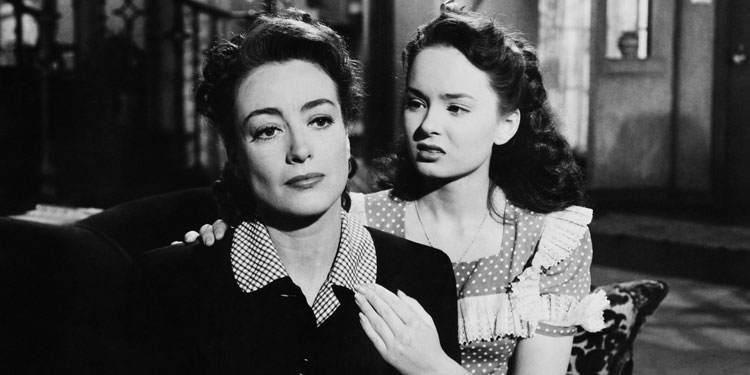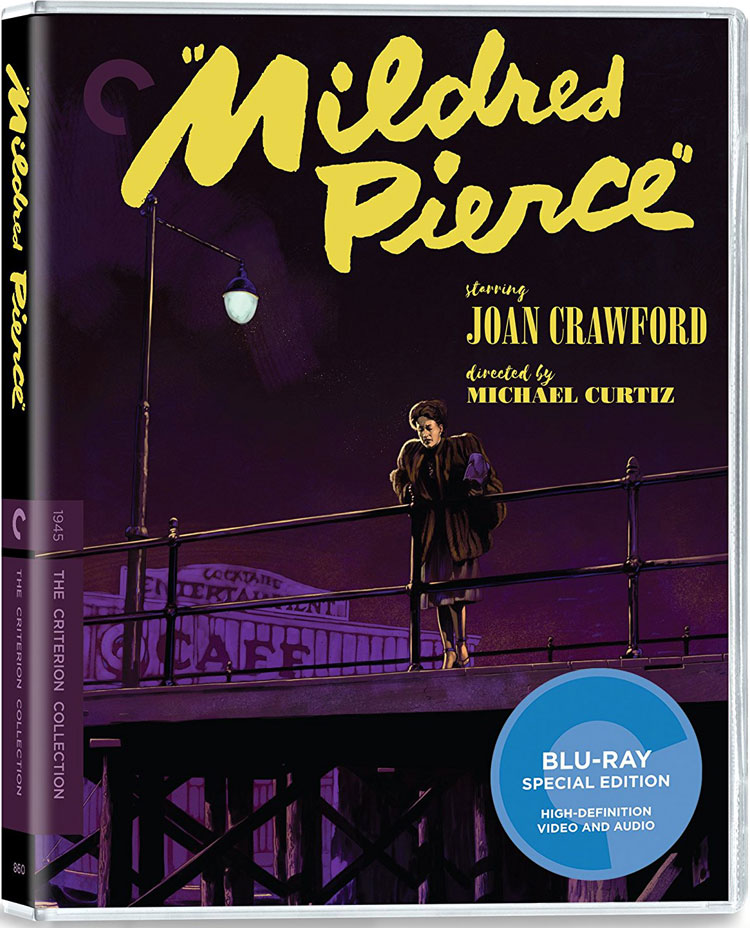
Director: Michael Curtiz
Running Time: 111 mins
Certificate: PG
Release Date: February 27th 2017 (UK)

In the annals of film noir there’s nothing quite like Mildred Pierce, which manages not just to touch the bases of that particular brand of crime drama, but which is also a ‘women’s picture’, taking the issues of a working mother seriously. Even at the time it was made it was an unusual film, as evidenced by the original trailer, which presents Joan Crawford as a noir femme fatale full of malice, while in the actual movie she’s someone rather different.
Crawford is the titular Mildred, a housewife with two daughters and a rocky marriage. She’s keen to give her kids everything they want, especially the demanding Veda (Anny Blyth), who wants the best clothes, the most sophisticated life and plenty of money. After the total breakdown of Mildred’s marriage, she starts up a restaurant, hoping to give Veda the life she wants.
That gets Mildred involved with the old-money cad, Monte Beragon (Zachary Scott), who she starts to fall for. While the restaurant is a success – thanks to Mildred’s shrewd business acumen – Veda is never satisfied, wanting more and more, and becoming increasingly manipulative. While Mildred desperately tries to hold everything together, the men in her life and her cold-hearted daughter threaten to tear it apart. And that leads to murder.
In some respects Mildred Pierce is an immensely silly film, full of moments that could easily make a modern audience giggle. Whether it’s the fact that Crawford ensures that even when she’s supposed to be penniless she looks ridiculously glamorous, or that the fast-paced noir dialogue sometimes doesn’t actually make any sense at all.
However, it’s still a brilliant film. A lot of the credit for that has to go to Crawford, who is simply brilliant and certainly deserved her Academy Award for the movie. She holds things together so well that it’s easy to overlook the movies flaws – not least of which is that Mildred seems utterly incapable of seeing that Veda is so evil that she’s one step away from having her head spin around and vomiting pea soup. It’s also a film that looks absolutely gorgeous, and this HD Blu-ray transfer really shows off the movie’s noir shadows and the fact the world it’s set in is on the edge of being hyper-real.
Another thing that helps it stand out is that underneath the melodrama and the fun of its film noir machinations, is that it has a real interest in the travails of a woman trying to make it in a man’s world. While many noir movies played into the 1940s paranoia about strong women emasculating men (a fear prevalent due to the fact WWII had created a female workforce that were now supposed to go back to the kitchen, and many didn’t want to), here Mildred is the hero while her daughter and the men around her use and abuse her, no matter how hard she tries. The film not only takes the issues of a single mother seriously, but also those of a woman in the workplace and the difficulties of building a successful business on limited funds.
The movie has also become a bit of a gay classic, despite the fact there’s no real gay content at all – unless you count the fact that Monte Beragon is played very much like the sexually ambiguous villains that were particularly popular in the 1940s. However, in other respects it represents a lot of what has come to be seen as culturally gay (whether people like that or not). Crawford is almost the model of the strong female so popular in much of gay culture. Coupled with the pitched high drama and emotion, and the fact Veda is one of the icons of film bitchiness and you can see why it’s long been popular with a certain type of gay audience.
This Criterion release contains a great selection of special features, one of which underlines the gay connection. The interview with Ann Blyth was filmed following a screening at San Francisco’s Castro Theatre in front of an audience of whooping, hollering gay men. There are also vintage interviews with Crawford and the man who wrote the novel the film is based on, James M. Cain, and a great 90-minute documentary that takes you through Crawford’s career from beginning to end. Finally, there’s a newly filmed conversation between critics Molly Haskell and Robert Polito, who do a great job of discussing the issues in the movie, and helping even those viewers who are familiar with the movie to see new things in it.
Overall Verdict: The definitive Joan Crawford film, which manages to take the issues of women seriously, while also being the hyperbolic pageant of backstabbing, high emotion and crime that’s made it beloved by gay audiences for decades.
Reviewer: Tim Isaac
Leave a Reply (if comment does not appear immediately, it may have been held for moderation)